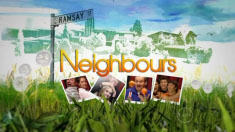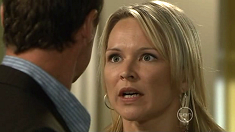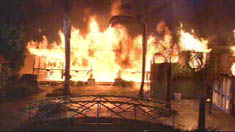|
.
Interviews
> Ben Marshall
|

|
Ben Marshall has been writing on Neighbours since 1999, and has also been a storyliner for the show. Here he shares with us how he first got into writing, and some of his highlights from working on Neighbours...
Can you give us a background on your career and involvement in the television industry prior to Neighbours?
I was a registered nurse, working either in intensive care units or out on remote Aboriginal settlements, when a friend asked me for some of my medical war stories for a new soap he was working on in New Zealand. I obliged, and was later was offered a job doing medical research and storylining for the show, Shortland Street. I fell in love with storytelling and stayed there for six years.
How did you first come to work on Neighbours?
My wife and I came back to Australia in Ď98, and I started watching the show, preparatory to trying out as script writer. When I felt I had a handle on the characters, I rang up Louise Lenay in the writing department and unashamedly name-dropped, ineptly schmoozed, and finally just begged for a try-out, vowing that with one read of my deathless prose, she and Jude Colquhoun would take me on. They did.
Were you a fan of the series before joining the crew?
No. In fact prior to writing for television, Iíd virtually never watched a soapie. In my uninformed and arrogant young-male way, Iíd assumed that soap opera was mental chewing gum for people without lives of their own. What I learned at Shortland Street was that soap is storytelling, and that if you tell a good story well, even with a low soapie budget, you share laughs, tears, drama and great moral truths with the community you live in. By the time I got to Neighbours, I was motivated and skilled enough to attempt to join the team.
As well as writing scripts, you also worked as a storyliner. What does this job involve? Were you responsible for creating any key characters during this period?
Good storylining requires an unusual and rare combination of skills. Ego and dignity should be left outside the storylining room, because around the Table of Pain (or Table of Ultimate Disclosure) one is obliged to plunder oneís past and present, revealing all in the quest for story, psychological understanding of what a character can be put through story-wise, and for cheap laughs to keep the others amused. Ideally it is stories that compete at the table, not ambitious storyliners. Itís true you must fight for your story, but if the consensus is favouring anotherís, you must shift immediately behind that to give it the depth and emotional truth every story needs. Delicate egos are useless in such a space, and big egos destructive. You also need a good gender balance around the table, and a reasonable age spread. As for characters, Iíve helped with a few, but itís always a collaborative affair. I had a bit more input into a few, like Zeke and Rachel, but if I can have a favourite creation, mine was a daily called Penny Ė a total geek who understood and found amusement in number theory, and thought Steven Hawkingís A Brief History of Time was a very light-weight read.
|

|
Who have been your favourite Neighbours characters to write for over the years?
Any well-constructed, clearly defined character Ė that is, one with strong internal conflict built in from scratch Ė is a joy to write. Whether itís Harold in a dramatic moment, or Harold in a light-weight bit of banter with friend and nemesis, Lou, if I know the character well enough to know how theyíd react in any given situation, the dialogue and action almost writes itself. But, okay, favourites? I love Toadie, Harold, Steph, Susan, Karl, Zeke and Rachel, Paul Robinson, all of the Timmins, and, of course, Izzy. Knowing the actors can take anything you throw at them Ė no matter how much they curse us in the Green room prior to shooting Ė is also great blessing when youíre writing for them. Truthfully, my dialogue is mere garnish compared to the work the actors do Ė I have such huge respect for those actors and directors who dig for the emotional truth in a scene.
How does a typical writing assignment on Neighbours work for you?
Today Iím reading through the storylines in the weeks between my last script and my current one Ė which is about a dayís work in itself. Iíll then look at how my ep sits in the week, and then how the ep can be constructed to fit well within that, yet flow on-screen as a semi-self-contained piece of drama. Iíll take about three days on my first draft, and another two to polish. Oh, and for anyone wondering, itís harder than it looks.
What do you think are the strengths and weaknesses of the Neighbours format?
The Neighbours writing department template has been exported around the world, and for good reason Ė itís efficient. It can be seen as a small factory that produces, on time, every week, storylines and scripts that can be reliably used without modification on set by actors and directors. The principal weakness is character drift. Over a period of time, a character that was (hopefully) well-defined, becomes fuzzy and interchangeable. This is occasionally the fault of the actor wanting to pull their on-screen persona toward something that makes them look better, but mainly itís the fault of the hard-working, fast-moving in-house writing department. In the day-to-day scramble for story, characters are sometimes made to act in a way that is not typical to their character, just to keep the story moving along. But if we engage the characters in insufficiently motivated and atypical behaviour, we slide into melodrama. If we stick to character, however, especially a really well-constructed one, the story writes itself. To any writers out there, I cannot emphasise enough that last point.
How important is the comedy in Neighbours, in your opinion? Is it something that youíre particularly conscious of when writing for the show?
Comedy is tragedy plus time. Itís also the tragedy of hope meeting the real world. When writing parts of script that require humour, just digging out the emotional truth and exposing the gap between reality and a given characterís actual behaviour can do the trick. Iím not gifted in the witty line department, sadly, and too many ďgagĒ lines quickly look forced and inappropriate. But I do know real life, and in real life, one only has to be in group of people in a truly difficult circumstance for five minutes before someone makes a fart joke. In Neighbours, less is more, and natural lo-fi humour is best.
What do you most enjoy about your involvement with Neighbours?
Storylining. Iíve loved working with my colleagues. Iíve learned from them, and admire them greatly. Every day is eight hours of laughter and hard work in equal measure.
Youíve been a Neighbours writer since 1999 Ė how do you believe the show has (or hasnít) changed during that time?
Okay, lame metaphor time. The Neighbours writing department is a large, slow-moving ship. The captain at the helm is the Story Editor, and they sail through the storms of network disquiet, overseas sales caveats, timeslot restrictions, the censorship board, lobbyist protests and viewer reactions. Different captains can steer closer or further away from the goal, the production of engaging character-based serial drama. Since Iíve been writing for Neighbours, the overall trend has been to engage more with relevant community issues, and steer closer to real life. Less hokey stuff, I guess, though humour Ė real life humour Ė is still very important to help present emotional truths, and to distinguish us from more earnest soaps.
|

|
Youíve been responsible for numerous popular episodes Ė including the dramatic Lassiterís fire in the 2004 season finale - do you have any scenes or moments you wrote that you were particularly pleased with?
There are too many scripts for me to be specific Iím afraid. As corny as it might sound, I know that if any scene Iím writing brings a tear to my eye, or makes me laugh, itís not only satisfying, but is probably also on the right track. The most satisfying scenes are usually the quiet, small, emotionally complex ones that best reflect real life. The emotions I most like to feel arenít the obvious ones like love or hate, but those scenes that evoke poignancy, or reflect the small joys of life.
What do you think accounts for the huge success Neighbours has continued to enjoy over the past 24 years?
A little luck to get the show into position, a bit of momentum to keep it on course, a tremendous amount of love and hard work from the writers and crew, and the stunning love and loyalty of the viewers.
What's next for Ben Marshall?
Apart from my next script, finishing two novels and a book of short stories for younger readers, and finding a publisher brave enough to take them on.
Interview by Steve. Added on 13th September 2008
Back
|

